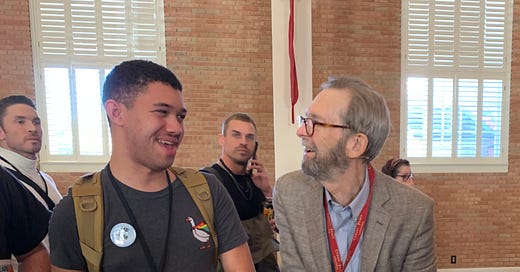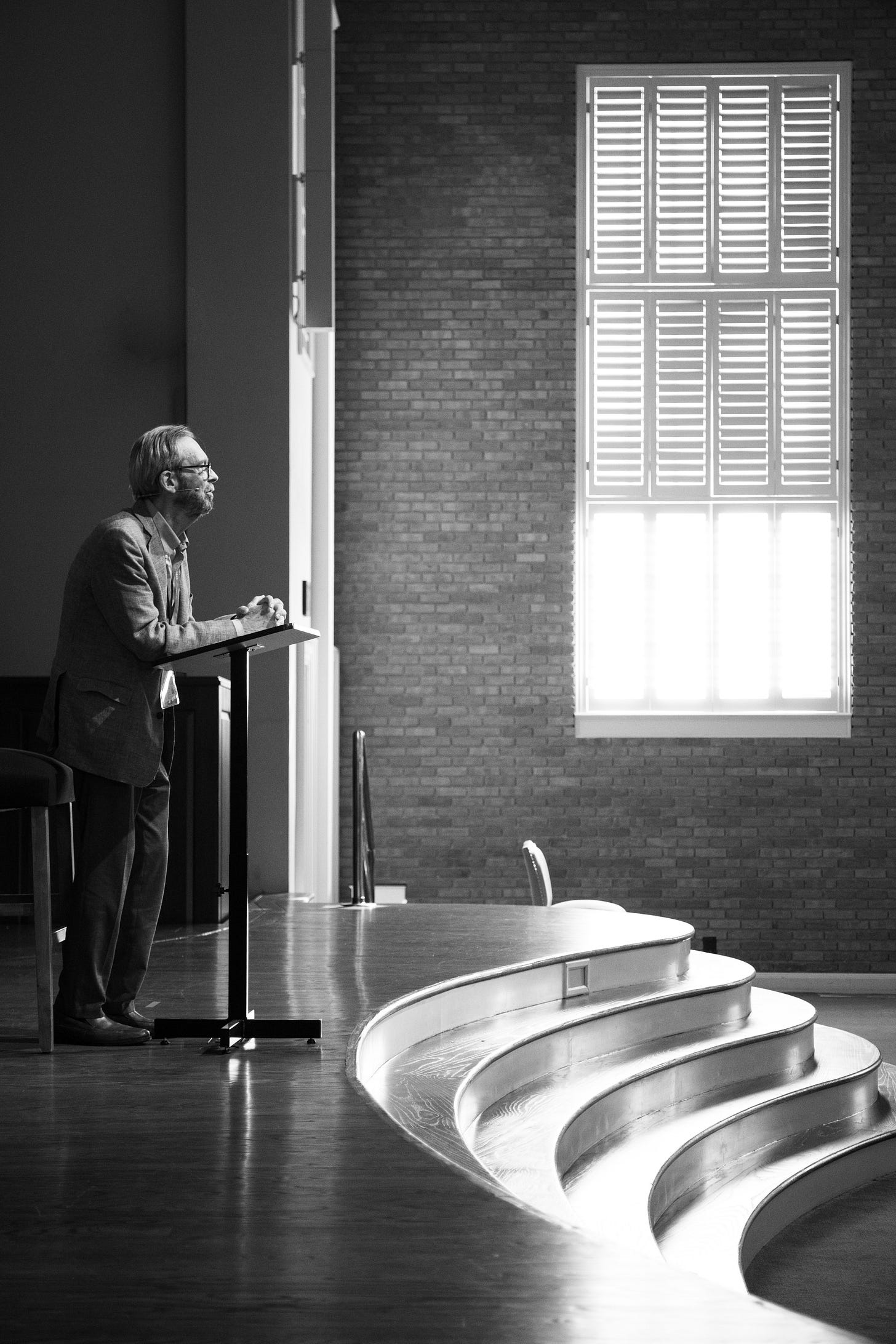Richard Hays' Last Word (VIDEO)
The final public address of a courageous New Testament scholar.
Previously, I shared the one hour live interview I did with Dr. Richard Hays. At the end of this post, I share a 25 minute keynote address he gave on the same day.
The last time I saw Richard Hays was on Friday, October 25, 2024. It was about 5:30pm and we were facing each other in the Wilshire Baptist Church parking lot as he awaited his ride to the DFW airport. He was in Dallas for the CenterPeace Conference—his last public speaking engagement. As we looked at each other and said our goodbyes, the softness in his eyes moved me. There was a gentleness about him, accentuated by the frailty of his body. We both knew it might be the last time we shared company during this earthly life. With a hug, I sent him off to catch his flight. Yesterday, only two months later, the renowned New Testament scholar died on January 3, 2025 in Nashville, Tennessee.
No doubt, many will write tributes to honor such an incredible biblical scholar whose writing, teaching, and speaking will continue to be a tremendous gift to the church for years to come. As a seminarian, I was first drawn to Richard Hays because of his work on “echoes of Scripture”— where he describes ways New Testament writers interpreted the Old Testament. I was also intrigued by his work on ethics. But while, an obituary discussing his extensive bibliography is a worthy effort, I want to reflect more personally.
In many ways, my friendship with Richard (and his wife Judy) was just getting started. And, so I grieve the loss of what more time could have given if we had many more years left for engaging conversations on Scripture and the Christian life. It was only six years ago that Richard asked if we could meet to discuss my new book Scripture, Ethics, and the Possibility of Same-Sex Relationships (2018). At the time, we attended the same church, CityWell UMC, in Durham, North Carolina. We saw each other in passing most Sundays, but had not yet visited outside church. And I didn’t realize he was rethinking his own traditionalist position on same-sex relationships, a position he had long held and articulated in his book The Moral Vision of the New Testament (1996).
Over a cup of coffee at Mad Hatter Café, Richard took out his underlined copy of my book, flipped to various pages and asked me to expand on certain points. I could see he was genuinely interested in what I had to say, which both surprised and touched me deeply. For a scholar of his stature to take me seriously meant the world to me. One phrase he underlined in my book was “yes, and,” where I had written, “I still affirm God’s good creation of male and female complementarity. My response to traditionalists is not, ‘No you are wrong’ or ‘Yes, but.’ My reply is ‘Yes, and” (p. 112).
During our first conversation, Richard was still a traditionalist in his views on same-sex relationships, but he was asking questions. He also cared a great deal about unity in the Body of Christ and was processing how the United Methodist Church might stay together amid differences. About a year after our initial discussion, he asked for feedback on a draft article laying out his suggestions for the UMC, which he contemplated submitting to Christian Century or disseminating at UMC General Conference. But Richard felt hesitant; he was still working through his own views. In many ways, our friendship exemplified what he longed for in the Church, namely, the ability to talk over a cup of coffee or worship together even when we don’t see eye to eye.
Eventually, both of us moved away from Durham just as Covid was becoming the new normal. I went to Texas to be with my fiancée after long-distance dating for a year, while he and Judy moved to Tennessee to be closer to family. In December 2020, he replied to my wedding invitation, “Yes, we would like to attend your wedding virtually on Dec. 5.” Even as he still wrestled with his own theology on the matter, Richard saw Christ in me and other gay Christians he knew. He didn’t have all the answers worked out, but he wanted to be a witness to our vows. Unfortunately, the pandemic canceled our church ceremony, as it did for so many others. Sally and I married in a park without all the friends and family we hoped would be there, and without the internet to broadcast to friends afar.
Richard and I continued to dialogue occasionally and provide feedback on each other’s work (my book The Word of a Humble God published in 2022 and his and Christopher Hays’ book The Widening of God’s Mercy that was soon to be released.) In fall 2023, Sally and I were passing through Nashville, allowing us to enjoy a meal with Richard and Judy. It was a wonderful two hours of catching up. During that dinner, I asked Richard to clarify certain things he had written in the draft version of The Widening of God’s Mercy. I reflected on his response in my journal later that night:
I asked how he would describe his views now. He said he considered himself an accommodationist for awhile . . . But then he shifted from that. He felt maybe something else would better describe his views, like Robert Song’s view, the eschatological take that affirms same-sex covenanted relationships, but not marriage. But then he didn’t think that only calling them same-sex unions and not marriage seemed quite right. He thought the telos of marriage as procreation seemed more Augustinian than Genesis or the New Testament. He said that sexual orientation is simply a reality and we need to take that into consideration . . . He said, and I quote, “We need to affirm and celebrate same-sex unions.”
A few months later, I asked Richard if he would speak at the 2024 CenterPeace Conference. CenterPeace was founded by Sally Gary in 2006 to help churches have constructive conversations on faith and sexuality. It creates spiritual community for LGBTQ people and works to fully integrate LGBTQ Christians into the life of the Church. The ministry also serves parents of LGBTQ loved ones and pastors and ministry leaders.
Richard wanted to attend the conference but had been experiencing health troubles after the complete removal of his pancreas the summer before. He needed to wait and see. But a couple months before the conference, he felt strong enough to commit. I was overjoyed. He made the decision to come even as he awaited test results to see if the cancer had metastasized. He said even if the tests showed cancer, it would take awhile for that reality to impact his body. In other words, Richard knew his death might be imminent but he chose to make his speaking engagement at the CenterPeace Conference his last public address.
Richard was only in Dallas for about 24 hours but he made the most of it, including signing books and greeting people after he spoke. The audience was deeply moved. More than one LGBTQ person had tears in their eyes because of Richard’s willingness to publicly admit a change of heart. It was healing for many. But for Richard and me, the healing went back even further than his confession. It went back to that conversation in a coffee shop when we had different viewpoints and yet extended our friendship to one another. Even as he changed his mind, Richard wanted mercy to prevail. He wanted kindness across differences.
In a one hour interview I did with him at the conference, I said most people would want to protect their legacy at the end of their life by not making controversial statements. Didn’t that concern him? Richard replied:
“I don’t want the first paragraph of my obituary to say ‘New Testament scholar Richard Hays who wrote against the acceptance of gay and lesbian people has died.’ . . . When you come to think something is wrong the thing to do is to confess and seek forgiveness . . . Probably now the first paragraph of my obituary will say “New Testament scholar Richard Hays who changed his mind and became a gay advocate.” Maybe it will. I would rather have that than the alternative, if I can put it that way. . . But I also think the legacy of being willing to rethink, to repent, to receive new information, to have the humility to be able to say I was wrong. I think that’s not a bad example.”
In addition to the interview, Richard gave a separate 25-minute keynote address. In the video below, you can listen to his last public address (or click here). Thank you, Richard Hays, for your friendship and your courage. I sure will miss you.








Thank you Yahweh for courageous men who speak the truth even when they've changed their mind. And God bless strong smart women who help us to learn things we never thought we could.
I didn’t realize he passed. What a blessing to be able to speak to him one last time about his important book.